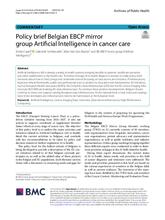Last updated on 12-9-2025 by Lieke Vervoort
Auteurs
Emilie Cauët; Gabrielle Schittecatte; Marc Van den Bulcke; Valentina Albarani; Allaoui, El Maati; H Antoine-Poirel; Sarah Baatout; Glenn Broeckx; Marcela Chavez; Coche, Emmanuel; Romaric Croes; Pieter Demetter; Chloë De Witte; Louis Delsupehe; Frederik Deman; Amelie Dendooven; Jennifer Dhont; Gokhan Ertaylan; Thierry Gevaert; Stefan Gijssels; Koen Hasaers; Karin Haustermans; Rudy Hovelinck; Roland Hustinx; Sébastien Jodogne; Lies Lahousse; Steven Lauwers; Stephane Lejeune; Arthur Leloup; Evi Lippens; Benoit Macq; Brigitte Maes; Carlos Meca; Ward Rommel; Roberto Salgado; Bart Schelfhout; Wim Schreurs; Gwen Sys; Lien Van De Voorde; Isabelle Van Den Bulck; Johan Van Lint; Wim Van Roose; Kristel Van Steen; Ad Vandermeulen; Pieter-Jan Volders; Yogeswaran, SureshTrefwoorden
Article written during project(s) :
Samenvatting:
Artificial Intelligence (AI) is already a reality in health systems, bringing benefits to patients, healthcare providers, and other stakeholders in the health care. To further leverage AI in health, Belgium is advised to make policy-level decisions about how to fund, design and undertake actions focussing on data access and inclusion, IT-infrastructure, legal and ethical frameworks, public and professional trust, in addition to education and interpretation. EU initiatives, such as European Health data space (EHDS), the Genomics Data Infrastructure (GDI) and the EU Cancer Imaging Infrastruct…



